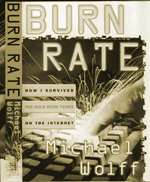"Burn Rate" by Michael Wolff
Burn Rate: How I Survived the Gold Rush Year on the Internet by Michael Wolff (256 pages, Simon & Schuster, 1999)
(originally published by Booz & Company) Eventually, though, even pedaling as fast as you can, [stuff] catches up with you," concludes Michael Wolff in his anything-but-academic book, Burn Rate: How I Survived the Gold Rush Years on the Internet. Using the sometimes rough, sometimes scatological style of a journalist, which he is, Mr. Wolff has written a painful and funny story of how he started out as a digital revolutionary, tried to transform himself into a respectable candidate for an initial public offering, then ended up about where he started.
Eventually, though, even pedaling as fast as you can, [stuff] catches up with you," concludes Michael Wolff in his anything-but-academic book, Burn Rate: How I Survived the Gold Rush Years on the Internet. Using the sometimes rough, sometimes scatological style of a journalist, which he is, Mr. Wolff has written a painful and funny story of how he started out as a digital revolutionary, tried to transform himself into a respectable candidate for an initial public offering, then ended up about where he started.
Out of the process he learned this: In business, you pretty much get what you deserve, even when it happens in Internet time.
Though it might seem obvious, the lesson is an important one.
At the narrative level, Mr. Wolff's engaging account of his feverish attempts to launch his company, Wolff New Media, on the breaking Internet wave and surf his way to unimaginable riches takes on the compelling quality of a morality play. It is played out amid greed and credulity as old as business itself. Here is Everyman (Mr. Wolff), the founder of a modestly profitable editorial company composing content for the new medium of the Net. Here is the tempter (Bob Machinist of the venture capital firm of Alan Patricof) goading Mr. Wolff into breakneck expansion with the promise of $100 million and material security for his family for generations.
"Almost immediately," comments Mr. Wolff laconically, "disbelief becomes absolute certainty. I thought I not only deserved what I was about to get but that I was being cheated out of more."
Here also is an assorted cast of hustlers, fixers and financiers, all apparently with the sole object of parting Mr. Wolff by stealth or force from ownership of his company. Their goal: control of the glittering prize — the initial public offering that will allow them to dump on others the job of making the company a real business rather than a get-rich-quick scheme for privileged investors. "Our mission," muses Mr. Wolff, "was to be out of here before we knew if the business was a hit or a flop."
And here, finally, is the chorus: Mr. Wolff's wife (and lawyer), Alison — the voice of conscience who says sotto voce the things that Mr. Wolff does not want to hear. "These are bad guys," she blurts out.
Mr. Wolff never does succeed in taking his company public, though he comes to see that his wife was right — that getting rich on the Internet means selling his soul to ratty investors and venture capitalists on the one side and dealing with the dominant America Online ("a certain order of hell") on the other. He resigns, writes a press release and signs a check for his own back pay, ending up, as in any good morality play, almost exactly where he began.
A sharp and observant writer, Mr. Wolff makes the most of the ironies and human frailties that litter this corporate Pilgrim's Progress, many of them his own.
At one point, Mr. Wolff marvels that one company to which he has sold a product genuinely believed it had bought the Internet rather than a randomly assembled database of Web sites. "In the age of the Internet, many Brooklyn Bridges will be sold," he reflects.
Above all, there is the central irony of Wolff New Media, a "contented and profitable" four-person company, which in two years from 1994 expanded revenues and personnel twentyfold, turned respectable profits into dramatic losses — and set the fuse burning. As with all the Internet hopefuls, the owners' gamble was that the company could parlay its blazing losses into an initial-public-offering payday or at least another round of funding before it reached the end of the fuse. "What's your burn rate?" a cynical observer asks an on-the-brink Mr. Wolff early on. "'All in all, about half a million a month or so,' I shrug. 'Rest in peace, baby.'"
Burn Rate works as a business book as well as a human story. Among a welter of breathless books about the wonders of the digital economy and how it will transform business as we currently experience it, Burn Rate is one of the first to bring cyberspace back down to earth.
While the speed of growth and change is indeed unprecedented, Mr. Wolff reminds us that in the end the Internet is subject to economic laws. There has to be a business model. Whether in the form of advertising, subscription or transactions, someone has to pay. Without an economic basis for existing, as Mr. Wolff's account makes clear, a large amount of Internet activity is in effect a giant pyramid scheme, "a Ponzi scheme based on talking the talk," much like other speculative frenzies throughout the ages.
One potent example of the hype: the reckless exaggeration of the size of the Internet audience. The gap between the claims and reality in early 1995 was "easily as high as 40 to one," Mr. Wolff estimates. But of course the Internet is not just hype; there is genuine change and innovation amid the relentless spin, which is precisely why distinguishing fact from fiction is so difficult. Today's lie becomes tomorrow's fact. As Mr. Wolff puts it: "One of the fascinating things about this business, and one of the things that makes it almost impossible to predict, is that virtually any prediction you make is bound to come true."
Mr. Wolff paints the most convincing picture yet of what it is like to be in the eye of what economist Joseph Schumpeter called capitalism's "gale of creative destruction." It is the moment when a new technology gathers momentum, creates vast opportunities and shoulders aside old certainties. "The cost of entry was minimal, the required knowledge base was so idiosyncratic that few could claim a meaningful head start and there was little or no competition, regulation or conventional wisdom.... It was start-up time," Mr. Wolff writes.
But — stuff does catch up with you. Tracing the wild lurches of fortune in the early history of the Net -- the rise and fall of the online services, the emergence of the Web, the monopoly and then near-eclipse of Netscape, the war of the search engines, the debacle of big companies such as Time Warner, the improbable ascendancy of AOL — Mr. Wolff is forced to recognize another truth. The Internet is not, as the East Coast media companies wanted to believe, a new medium in which "content is king." However well crafted the content, he laments, "We could see the 'user' hover for a second, or half second, and alight on a paragraph and then linger for a moment and be gone. Bolt. Vamoose. Vaporize." Mr Wolff explains, "In some perfect irony we had created a new publishing medium," but there was no one to read it.
The more prosaic reality, Mr. Wolff came to believe, was that the Internet was not a new medium, like television or cinema, but a communications technology, like the telephone. It was a glorified phone with wonderful and startling commercial possibilities, true, but still a utility or part of the infrastructure rather than a medium for creative endeavor. The Net is for looking up factual information, such as airline flights or stock prices, or buying things, such as computers or, well, sex.
Beyond a few quibbles, Burn Rate is the most compelling business narrative since the Michael Lewis description of real life on the wild side in Liar's Poker: Rising Through the Wreckage on Wall Street. Mr. Wolff's story serves as a provocative guide for anyone trying to make sense of the Internet's turbulent history. What is more, studded on almost every page are business lessons that are all the more poignant for the painful experience they represent. "If you don't know who the fool is in the deal, it's you." "The most expensive thing you'll ever buy is money."
In other words, digital business may be the new rock 'n' roll; but it is the same old stuff that gets you in the end. ![]()
| Authors
Simon Caulkin (scaulkin@easynet.co.uk) writes a weekly management column for The Observer in London. He was named the U.K.'s 1997 Industrial Journalist of the Year by the Industrial Society. |


